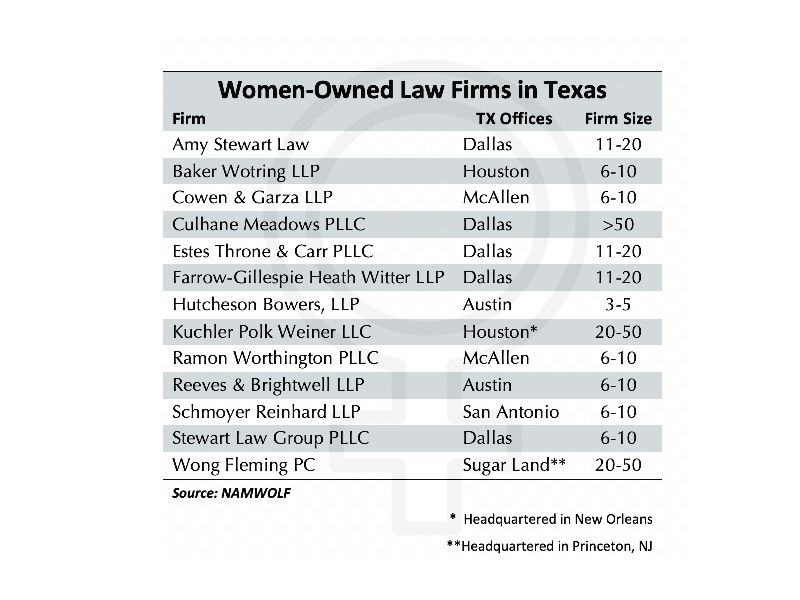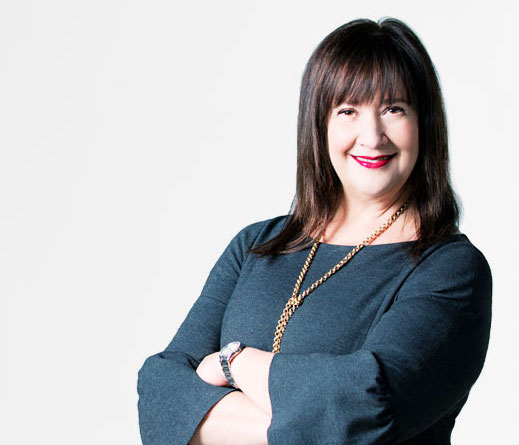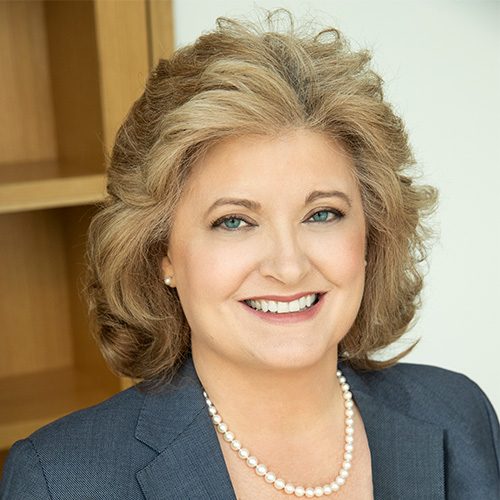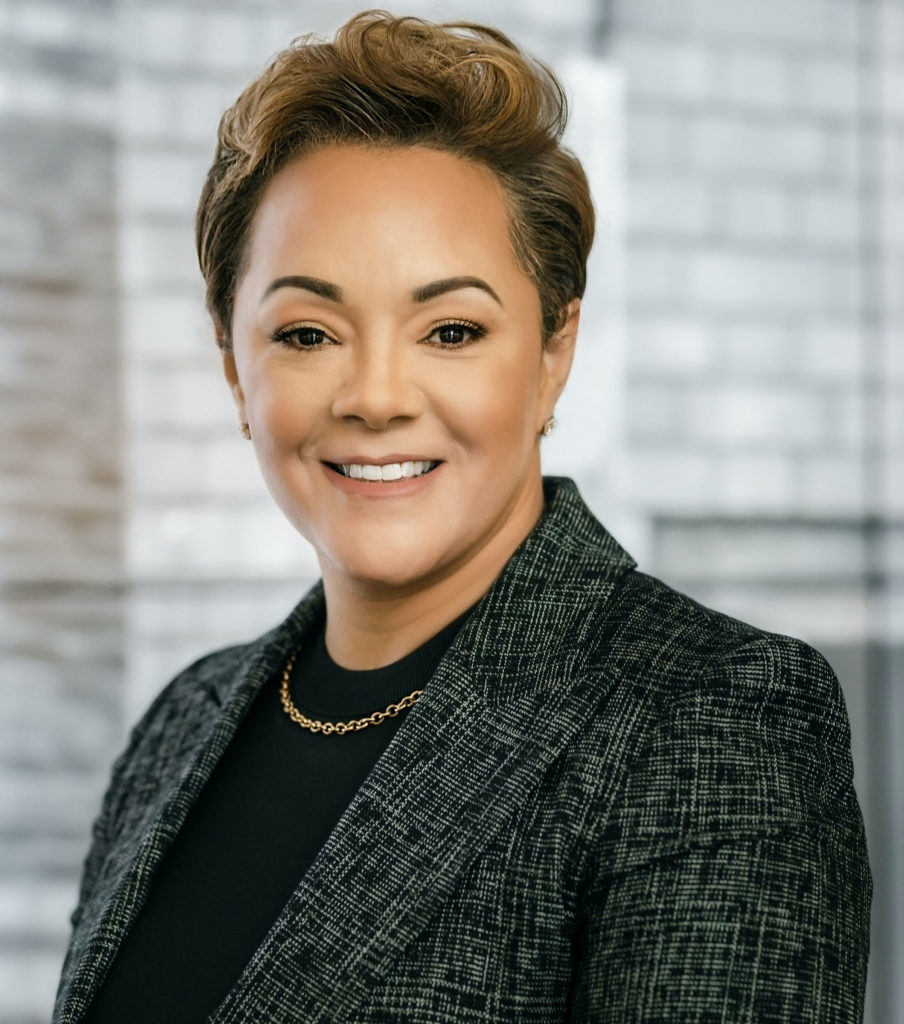For many women lawyers, the definition of career success is being named an equity partner at a large firm or general counsel at a large corporation, but a handful of women-owned boutique firms model an alternative path to success.
There are 13 law firms in Texas registered as women-owned with the National Association of Minority and Women Owned Law Firms, or NAMWOLF. While small in number, these firms represent an impressive roster of clients including Fortune 500 companies and large government agencies.

The women who founded these firms have grown their practice, all while overcoming challenges of starting a business, such as access to capital and getting clients as well as the constant pressure to merge into a large firm.
The impetus to start their own corporate firm was to find a way to move forward in their careers, create a company and work environment that reflected their values and priorities and increase female and minority representation in the legal field.
Amy Elizabeth Stewart: At a Crossroads

“That really seemed to be the stalling out spot, and I didn’t want it to be the stalling out spot.”
— Amy Elizabeth Stewart, Amy Stewart Law
For Amy Elizabeth Stewart, who founded Amy Stewart Law in 2009, starting her own firm came from a desire to continue moving forward in her career. For 12 years, Stewart was a non-equity partner at New-York based Wilson Elser Moskowitz Edelman.
Once a lawyer makes partner at a firm, they either have control of their business, which gives them power, or they don’t, Stewart said.
“That really seemed to be the stalling out spot, and I didn’t want it to be the stalling out spot,” Stewart said.
She wanted to move forward in her career, so Stewart hired a career coach. At the time, Stewart wasn’t planning on leaving the firm. Her coach helped her figure out what she wanted in her career and take steps to move in that direction.
She had four choices – keep the status quo, stay in the same firm and try something different, make a lateral move to a different firm, or try something new at a different firm.
“That got the wheels turning, and after talking to different people and exploring different options, I decided to start my own firm,” Stewart said.
Today, the firm’s nine attorneys represent corporate policyholders in complex insurance-related matters.
Meloney Perry: Learning the Business

“You had the movers and shakers at the clients’ [companies] that were still the men all on the golf courses.”
— Meloney Perry, Perry Law
When Meloney Perry started her firm, Perry Law, she didn’t think of it as a women-owned firm; just a firm that she started.
“Then I started thinking, ‘You know, I liked the idea that I’m woman-owned,’” Perry said. “I had clients tell me, ‘We love it. You’re a woman, you’re a woman-owned business.’”
Perry credits her time as a partner at Baker McKenzie for helping her learn the accounting aspects of running her own law firm.
“I loved — and Baker McKenzie is famous for — how they do their accounting,” Perry said. “They were very transparent about how the accountant did things, and what they looked at.”
Before launching her firm in 2013, Perry took several months to research and set up her own billing database. She worked with a Dallas-based community bank, Pegasus Bank.
Perry thinks one of the reasons there aren’t more women-owned law firms is a lack of access to capital. When Perry graduated from law school in 1994, there weren’t any women-owned firms.
“Back then, nobody was going to lend you money,” Perry said. “And nobody was really supportive because you had the movers and shakers at the clients’ [companies] that were still the men all on the golf courses.”
It’s still difficult to get a loan from a large commercial bank, and lawyers wanting to establish their own firm need money for startup costs, such as technology and health insurance for staff, Perry said. It was because of her relationship with the local bank that she was able to get a line of credit for all her startup costs, which she was able to pay back.
“They were willing to take a chance on me,” Perry said. “I was able to implement all the things I had learned at the other firms.”
Today, Perry Law has three full-time attorneys – all women; three full-time paralegals; a full-time intern and the use of contract attorneys, when needed. The firm represents insurance companies in litigation.
On one hand, Perry said she could have started her firm earlier, using the skills she learned at other firms. In reality, she admits, she couldn’t, especially not while she was an associate. As an attorney on the defense side, she needed to have clients and contacts.
“I had already established myself,” Perry said. “My clients said, ‘We hire you, not the firm.’”
More importantly she was able to create an office atmosphere that she wanted. For example, she can close the office the day after Thanksgiving, host a birthday party for staff members and create a positive office atmosphere.
“I wanted a good team atmosphere,” Perry said.
As a mom, she was able to bring her daughter to work after school, where her daughter had her own little office.
Dawn Estes: Representation Matters

Founded in 2008, Estes Thorne & Carr has represented such clients as AT&T, Prudential, Kroger and the FDIC.
Dawn Estes
Before Dawn Estes, founding partner of Estes, Thorne and Carr, left Gardere Wynne Sewell to start her own firm, she learned about Houston-based Powers and Frost.
Her friend Kimberly Phillips, general counsel of global litiation at Shell, told her that the energy company used women-owned firms as outside counsel. For Estes, because someone else had done it before in Houston, it was a legitimate idea.
Founded in 2008, Estes Thorne & Carr has represented clients such as AT&T, Prudential, Kroger and the Federal Deposit Insurance Corporation. Knowing that Powers and Frost was a successful women-owned law firm was impactful to Estes, and she hopes her firm will inspire other women attorneys.
Amy M. Stewart: ‘Truly Diverse’

“I like collaborating with different women and celebrating what other women-owned law firms and what other women lawyers are doing.”
— Amy M. Stewart, Stewart Law Group
Amy M. Stewart, founding partner of Stewart Law Group, wants to be an example to other minority-women lawyers.
“One of my guiding principles is that diversity and excellence aren’t mutually exclusive,” said Amy M. Stewart, founding partner of Stewart Law Group.
Stewart started her career at White and Wiggins, the oldest Black-owned law firm in Dallas before joining Estes Thorne & Carr. For Stewart, being a minority woman-owned law firm was important.
“I got to see the best of those two firms, and I just decided I want a truly diverse firm,” Stewart said.
She left Estes Thorne & Carr in 2017 to start her own litigation boutique. Today, her firm has 10 attorneys and represents clients like Frito Lay, American Airlines, Liberty Mutual and JP Morgan Chase.
A former college basketball coach at Wake Forest and Tulane University, Stewart also wanted a firm where she could focus on training and mentoring young attorneys.
“I want a firm that when they leave, people go, ‘Oh yeah, they were at Stewart Law Group. He’s a great trial attorney,’” she said.
Stewart sees the firm as a legal business not just a law firm. She’s hired a business director, in effect a marketing person, who makes sure that clients are happy with their service and staff. They also use analytics to decide whether to hire a new associate so that no one is overworked.
In March, Stewart Law Group announced a new marketing initiative with two other women-owned and minority-owned law firms: Austin-based Ramón Worthington Nicolas & Cantu and McAllen-based Cowen & Garza. The “We Have Texas Covered” marketing initiative is a way for these firms to support each other and their firms.
“I like collaborating with different women and celebrating what other women-owned law firms and what other women lawyers are doing,” Stewart said.
While she has gotten offers to merge with larger firms, Stewart plans to keep growing her own.
“We’re going to be here for a long time and what we have is extremely special,” Stewart said.
She would like to continue mentoring other attorneys so that in four or five years, she’s not the only minority and woman-owned law firm in Dallas.
One of the reasons there aren’t as many women-owned firms, Stewart said, may be lack of business.
“Women are normally put in the position of service partner, versus a rainmaker,” Stewart said. “This is not just me, this is the statistics speaking. They both have value, but it would be extremely difficult for a service partner to really start a business unless they are attached to a rainmaker.”
Stewart hopes that women look at her firm, Stewart Law Group, or Amy Stewart Law, or any of other women-owned law firms and become motivated to start their own firm.
“It’s hard obviously, but it’s so much more rewarding,” Stewart said.
